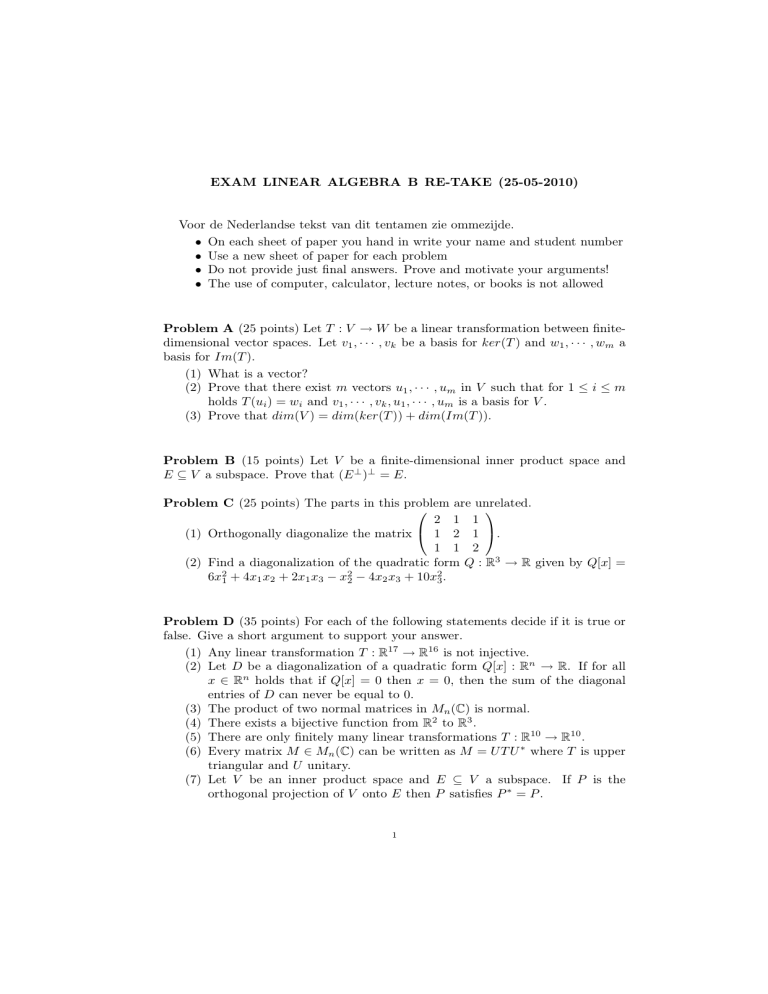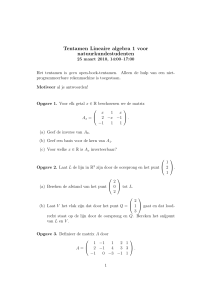
EXAM LINEAR ALGEBRA B RE-TAKE (25-05-2010)
Voor de Nederlandse tekst van dit tentamen zie ommezijde.
• On each sheet of paper you hand in write your name and student number
• Use a new sheet of paper for each problem
• Do not provide just final answers. Prove and motivate your arguments!
• The use of computer, calculator, lecture notes, or books is not allowed
Problem A (25 points) Let T : V → W be a linear transformation between finitedimensional vector spaces. Let v1 , · · · , vk be a basis for ker(T ) and w1 , · · · , wm a
basis for Im(T ).
(1) What is a vector?
(2) Prove that there exist m vectors u1 , · · · , um in V such that for 1 ≤ i ≤ m
holds T (ui ) = wi and v1 , · · · , vk , u1 , · · · , um is a basis for V .
(3) Prove that dim(V ) = dim(ker(T )) + dim(Im(T )).
Problem B (15 points) Let V be a finite-dimensional inner product space and
E ⊆ V a subspace. Prove that (E ⊥ )⊥ = E.
Problem C (25 points) The parts in this problem are unrelated.
2 1 1
(1) Orthogonally diagonalize the matrix 1 2 1 .
1 1 2
(2) Find a diagonalization of the quadratic form Q : R3 → R given by Q[x] =
6x21 + 4x1 x2 + 2x1 x3 − x22 − 4x2 x3 + 10x23 .
Problem D (35 points) For each of the following statements decide if it is true or
false. Give a short argument to support your answer.
(1) Any linear transformation T : R17 → R16 is not injective.
(2) Let D be a diagonalization of a quadratic form Q[x] : Rn → R. If for all
x ∈ Rn holds that if Q[x] = 0 then x = 0, then the sum of the diagonal
entries of D can never be equal to 0.
(3) The product of two normal matrices in Mn (C) is normal.
(4) There exists a bijective function from R2 to R3 .
(5) There are only finitely many linear transformations T : R10 → R10 .
(6) Every matrix M ∈ Mn (C) can be written as M = U T U ∗ where T is upper
triangular and U unitary.
(7) Let V be an inner product space and E ⊆ V a subspace. If P is the
orthogonal projection of V onto E then P satisfies P ∗ = P .
1
EXAM LINEAR ALGEBRA B RE-TAKE (25-05-2010)
2
Hertentamen Lineaire Algebra B (25-05-2010)
Please turn over for the English text of this exam.
• Schrijf op ieder vel papier dat je inlevert je naam en studentnummer.
• Gebruik een nieuw vel papier voor iedere opgave.
• Geef niet alleen eindantwoorden. Bewijs en motiveer je beweringen!
• Het gebruik van computers, rekenmachines, dictaten en boeken is niet
toegestaan.
Opgave A (25 punten) Laat T : V → W een lineaire afbeelding tussen eindigdimensionale vectorruimtes zijn. Laat v1 , · · · , vk een basis voor ker(T ) zijn en w1 , · · · , wm
een basis voor Im(T ).
(1) Wat is een vector?
(2) Bewijs dat er m vectoren u1 , · · · , um in V bestaan zodat voor 1 ≤ i ≤ m
geldt dat T (ui ) = wi en v1 , · · · , vk , u1 , · · · , um een basis is voor V .
(3) Bewijs dat dim(V ) = dim(ker(T )) + dim(Im(T )).
Opgave B (15 punten) Laat V een eindigdimensionale inproductruimte zijn en
E ⊆ V een deelruimte. Bewijs dat (E ⊥ )⊥ = E.
Opgave C (25 punten) De onderdelen van deze opgave zijn onafhankelijk van
elkaar.
2 1 1
(1) Orthogonaal diagonaliseer de matrix 1 2 1 .
1 1 2
(2) Vind een diagonalisatie van de kwadratische vorm Q : R3 → R gegeven
door Q[x] = 6x21 + 4x1 x2 + 2x1 x3 − x22 − 4x2 x3 + 10x23 .
Opgave D (35 punten) Geef voor elk van de volgende uitspraken aan of zij juist
of onjuist is. Geef een korte redenering om je antwoord te ondersteunen.
(1) Geen enkele lineaire afbeelding T : R17 → R16 is injectief.
(2) Laat D een diagonalisatie van een kwadratische vorm Q[x] : Rn → R zijn.
Als voor alle x ∈ Rn geldt dat als Q[x] = 0 dan x = 0, dan kan de som van
de diagonaalelementen van D nooit gelijk zijn aan 0.
(3) Het product van twee normale matrices in Mn (C) is normaal.
(4) Er bestaat een bijectieve functie van R2 naar R3 .
(5) Er bestaan slechts eindig veel lineaire afbeeldingen T : R10 → R10 .
(6) Iedere matrix M ∈ Mn (C) kan geschreven worden als M = U T U ∗ waarbij
T een bovendriehoeksmatrix is en U een unitaire matrix.
(7) Laat V een inproductruimte zijn en E ⊆ V een deelruimte. Als P de
orthogonale projectie van V op E is dan voldoet P aan P ∗ = P .












